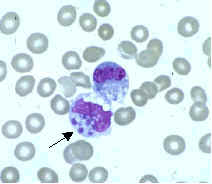Human monocytotropic ehrlichiosis
(Redirected from Human monocytic ehrlichiosis)
Editor-In-Chief: Prab R Tumpati, MD
Obesity, Sleep & Internal medicine
Founder, WikiMD Wellnesspedia &
W8MD medical weight loss NYC and sleep center NYC
| Human monocytotropic ehrlichiosis | |
|---|---|
| Synonyms | Human monocytic ehrlichiosis |
| Pronounce | N/A |
| Specialty | N/A |
| Symptoms | Fever, headache, malaise, muscle pain |
| Complications | Meningitis, respiratory failure, septic shock |
| Onset | 1 to 2 weeks after tick bite |
| Duration | Variable |
| Types | N/A |
| Causes | Ehrlichia chaffeensis |
| Risks | Tick exposure, outdoor activities |
| Diagnosis | Serology, PCR |
| Differential diagnosis | Rocky Mountain spotted fever, anaplasmosis, leptospirosis |
| Prevention | Tick bite prevention, protective clothing |
| Treatment | Doxycycline |
| Medication | Doxycycline |
| Prognosis | Generally good with treatment |
| Frequency | Rare |
| Deaths | Rare, but possible if untreated |
Human Monocytotropic Ehrlichiosis is a tick-borne disease caused by the bacterium Ehrlichia chaffeensis. This disease is primarily transmitted to humans by the Lone Star tick (Amblyomma americanum).
Symptoms[edit | edit source]
The symptoms of Human Monocytotropic Ehrlichiosis typically appear within 1-2 weeks following the bite of an infected tick. Symptoms can include:
- Fever
- Headache
- Muscle aches
- Chills
- Nausea
- Confusion
- Rash (occurs in approximately 30% of adults and up to 60% of children)
Diagnosis[edit | edit source]
Diagnosis of Human Monocytotropic Ehrlichiosis is based on clinical signs and symptoms, and can later be confirmed with specialized confirmatory laboratory tests. Treatment should never be delayed pending the receipt of laboratory test results, or be withheld on the basis of an initial negative laboratory result.
Treatment[edit | edit source]
The treatment of choice for Human Monocytotropic Ehrlichiosis is Doxycycline. Doxycycline is most effective at preventing severe complications from the disease if it is started early in the course of illness.
Prevention[edit | edit source]
Prevention of Human Monocytotropic Ehrlichiosis primarily involves avoiding areas where ticks are found and using insect repellents.
See Also[edit | edit source]
Search WikiMD
Ad.Tired of being Overweight? Try W8MD's physician weight loss program.
Semaglutide (Ozempic / Wegovy and Tirzepatide (Mounjaro / Zepbound) available.
Advertise on WikiMD
|
WikiMD's Wellness Encyclopedia |
| Let Food Be Thy Medicine Medicine Thy Food - Hippocrates |
Translate this page: - East Asian
中文,
日本,
한국어,
South Asian
हिन्दी,
தமிழ்,
తెలుగు,
Urdu,
ಕನ್ನಡ,
Southeast Asian
Indonesian,
Vietnamese,
Thai,
မြန်မာဘာသာ,
বাংলা
European
español,
Deutsch,
français,
Greek,
português do Brasil,
polski,
română,
русский,
Nederlands,
norsk,
svenska,
suomi,
Italian
Middle Eastern & African
عربى,
Turkish,
Persian,
Hebrew,
Afrikaans,
isiZulu,
Kiswahili,
Other
Bulgarian,
Hungarian,
Czech,
Swedish,
മലയാളം,
मराठी,
ਪੰਜਾਬੀ,
ગુજરાતી,
Portuguese,
Ukrainian
Medical Disclaimer: WikiMD is not a substitute for professional medical advice. The information on WikiMD is provided as an information resource only, may be incorrect, outdated or misleading, and is not to be used or relied on for any diagnostic or treatment purposes. Please consult your health care provider before making any healthcare decisions or for guidance about a specific medical condition. WikiMD expressly disclaims responsibility, and shall have no liability, for any damages, loss, injury, or liability whatsoever suffered as a result of your reliance on the information contained in this site. By visiting this site you agree to the foregoing terms and conditions, which may from time to time be changed or supplemented by WikiMD. If you do not agree to the foregoing terms and conditions, you should not enter or use this site. See full disclaimer.
Credits:Most images are courtesy of Wikimedia commons, and templates, categories Wikipedia, licensed under CC BY SA or similar.
Contributors: Prab R. Tumpati, MD


